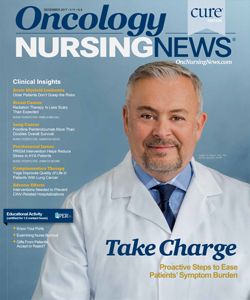The Elephant in the Pink Room: Living With Metastatic Breast Cancer
When Breast Cancer Awareness Month arrives each October, for many women there is a lot to be thankful for. Research advances have led to less aggressive treatment options and a good prognosis for women with early-stage disease, but for women with metastatic breast cancer (MBC), it is a different story.
Margaret (Peg) Rosenzweig, PhD, CRNP-C, AOCN, FAAN

Margaret (Peg) Rosenzweig, PhD, CRNP-C, AOCN, FAAN
When Breast Cancer Awareness Month arrives each October, for many women there is a lot to be thankful for. Research advances have led to less aggressive treatment options and a good prognosis for women with early-stage disease, but for women with metastatic breast cancer (MBC), it is a different story.
While treatable, MBC remains incurable. According to the Metastatic Breast Cancer Alliance, an estimated 150,000 women and men are living with metastatic breast cancer in the United States, and 40,000 individuals die from the disease each year—accounting for 7% of all US cancer deaths.1
“These women can sometimes feel like they are ‘the elephant in the pink room,’” explained Margaret (Peg) Rosenzweig, PhD, CRNP-C, AOCN, FAAN, professor, Acute & Tertiary Care, at the University of Pittsburgh School of Nursing. Rosenzweig also maintains clinical practice as a nurse practitioner for women with breast cancer at the university’s cancer institute (UPCI).
“There’s that sense that nobody in the waiting room wants to know someone with metastatic disease, because it’s everyone’s worst fear,” she continued. Some may feel unwelcome in the “pink ribbon world,” because they haven’t—to use the sports analogy that comes up often for all cancer types—“beaten their cancer.”
Another issue many patients with MBC face, she added, is coping with loved ones who sometimes don’t understand why they don’t go into remission and are never done with treatment.
Yet this pattern of ongoing treatment and careful monitoring is, in fact, a welcome improvement. Rosenzweig has been able to witness the course of MBC change for many women, into something more akin to a chronic disease model. “We expect that women are going to do well, that they’re not going to be incapacitated by the disease, though they have to make time for treatment and follow-up.”
The Educated Patient
Key to this “new normal” for many patients with MBC is having the knowledge and confidence to communicate frequently and openly with their providers and participate fully in treatment decisions. That ethos underpins efforts like Make Your Dialogue Count to improve the MBC patient—provider conversation.
This point was driven home in sharp relief for Ayanna Kalasunas, who found out just 1 month after becoming engaged that she had stage IV MBC in January 2013. She appreciated that her oncologist then and now, David M. Mintzer, MD, Chief of Hematology-Oncology at Pennsylvania Hospital, an affiliate of the University of Pennsylvania Health System, fully explained her diagnosis and treatment course, put her on trastuzumab immediately to ease her mind, and also continues to provide websites and fact sheets when she starts a new therapy to make sure any questions she has get answered.
“He has a strong opinion about my treatment, but it’s an educated one, and he explains how he arrives at his decisions,” she explained. That collaborative process with other specialists at the hospital reassures Kalasunas, who comes to her appointments well-informed and unafraid to ask questions, because of the rapport she has with her healthcare team.
“The stakes are really high, so where I probably didn’t question my doctors in the past, I feel that sense of urgency now,” she stressed. “I’ve been diligent from the start, and I think it’s really important that patients remember it’s their voice and they have rights … like any working relationship, it’s a two-way street.”
Now an active blogger and member of the board of directors of the advocacy group Living Beyond Breast Cancer, Kalasunas did not let her disease define her. She went on to marry her fiancé in 2014, buy a home in Philadelphia, and continues her treatment with her original oncologist at the Pennsylvania Hospital
The Nurse’s Role
How can the oncology nurse help foster this kind of open communication that patients with MBC and healthcare providers all agree is so vital?
Rosenzweig said the concept of anticipatory guidance that is often used in the pediatric setting can be applied in oncology. When parents are warned about the “terrible twos,” for example, they can prepare and talk about strategies with their provider before it happens.
In her practice, “that’s something we try to do and probably could do even more,” she said, “in terms of preparing women for the frequency of scans and the tension around getting the scan results,” as well as helping them cope with loved ones who sometimes don’t understand why patients with metastatic disease don’t go into remission and their treatment never ends. Nurses can help patients explain this to their families, she added, preparing their caregivers for what to expect in the next phase of treatment.
And, when the latest scan or bloodwork brings disappointing news? Rosenzweig said that, “it’s all about listening, and taking cues from the patient,” letting them know you are on their side and asking open-ended questions that give them permission to tell the nurse how difficult it is for them.
The recent Make Your Dialogue Count survey found that the communication needs and preferences for patients with MBC are not uniform and vary by their age and treatment stage.2 For example, at initial diagnosis, more women aged ≥54 years wanted to treat their breast cancer as aggressively as possible compared with their younger counterparts who expressed concern about adjusting to the treatment regimen and its effect on their lifestyle.
That optimism about stabilizing their disease held true for the older cohort during treatment change, whereas younger women, and especially those with children aged ≤17 years, were not as hopeful that they could keep their disease stable, nor were they as confident in the treatment options.
Thus, suggested Rosenzweig, oncologists, working with the nurse alongside, can pose a question such as, “Maybe we could talk about what your expecting from your next therapy,” to open the discussion about side effect burden with a new therapy, how the next step will impact their quality of life, and elicit the patient’s goals to make sure the treatment plan is congruent with those wishes.
As the UPCI’s Adam Brufsky, MD, who works with Rosenzweig, noted: “Nurses and nurse practitioners are extraordinarily important in all this … in many cases the nurse helps to fill these gaps in communication.”
Additional Resources
Following are just some of the many online resources where patients with metastatic breast cancer and their caregivers can be directed to find support and information:
- LivingBeyondBreastCancer.org An education and support group for women with breast cancer at all stages, including specific guides in its Metastatic Breast Cancer series, among them, “Guide for the Newly Diagnosed,” published in conjunction with the Metastatic Breast Cancer Network (www.mbcn.org).
- My MBCStory.com Beyond Pink: Sharing Our Metastatic Breast Cancer Story provides downloadable resources to help patients and caregivers to navigate this diagnosis.
- AdvancedBreastCancerCommunity.org With input from multiple metastatic breast cancer advocacy groups, patients can access resources and information for themselves, as well as find specific tools for their caregivers.
- CancerSupportCommunity.org Among its resources and tools is a worksheet for people with metastatic breast cancer: “Preparing for Your Doctor’s Visit.”
References
- Metastatic Breast Cancer Alliance. Changing the Landscape for People Living With Metastatic Breast Cancer (2nd edition); October 2014. http://bit.ly/1xEfQiO. Accessed October 2, 2016.
- Brufsky AM, Ormerod C, Bell Dickson R, Citron ML. Understanding the needs of patients with metastatic breast cancer: results of the Make Your Dialogue Count Survey [published online ahead of print September 13, 2016]. Breast J.

Nurse Practitioners Weigh in on Data From the San Antonio Breast Cancer Symposium
January 16th 2023Loyda Braithwaite, MSN, RN, AGPCNP-BC, AOCNP; and Jamie Carroll, APRN, CNP, MSN, highlight presentations from the 2022 San Antonio Breast Cancer Symposium that will influence oncology nursing practice.


